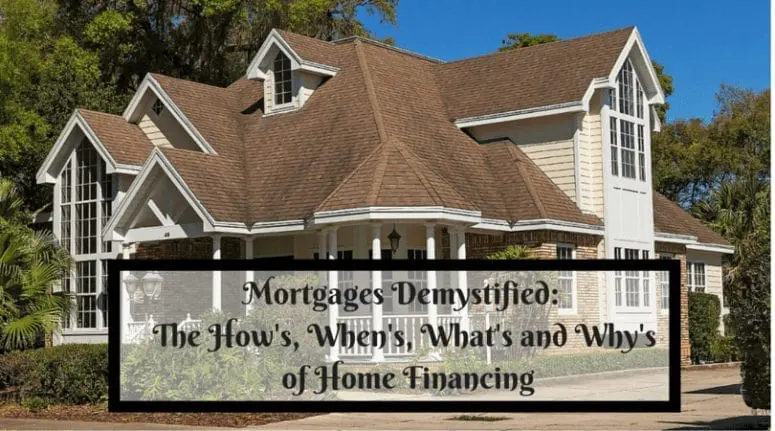Mortgages Demystified: The How’s, When’s, What’s and Why’s of Home Financing

You want to buy a home. It’s time. But how do you manage that mortgage? If you’re like most people, it’s a confusing topic. Here’s how to simplify it all.
Getting Good Interest Rate
Obviously, getting the best interest rate is a good thing. Interest is the cost of the loan you’ll be taking out. Think of interest as a cost that is associated with money lent over time. A bank could, in theory, lend you money or lend that same money to someone else. The choice to lend it to you means that the lender can’t lend it to someone else. This is opportunity cost, and it’s why you pay interest on mortgage loans.
For example, let’s say you use www.rabennett.co.uk to find yourself a home. You approach a lender and ask for a loan. The lender tells you that he will lend you £100,000 at 5% interest. That amounts to $5,000 in interest for the loan. This interest is the cost of that loan.
So, what the lender is telling you, in effect, is that by lending to you, the bank thinks it could invest that money and earn $5,000. Said another way, it is losing $5,000 by lending you money (rather than investing it), so it will charge you this interest, and you’re free to use it to buy the home, provided you repay the loan in full, with the added interest cost. You’re in a bidding “war” with the bank – the bank wants you to pay the highest interest possible, and you want to pay the lowest interest possible.
Avoiding Fees
Another aspect of getting a mortgage loan is the fees. Fees are charged, in addition to interest, for the use of money. Usually, lenders call these additional fees “points,” but they can also come in the form of origination fees, application fees, and other miscellaneous fees. In general, you want to pay the least amount in fees possible on your mortgages.
Avoiding An Early Payoff Fee
Early payoff fees are fees that are charged by the bank when you pay off your mortgage early. These fees are designed to keep you paying on the mortgage loan until the loan is fully amortized. For example, if you take out a mortgage loan for 30 years, the lender will generally want you to pay the loan off over 30 years. This is because while the interest rate on the loan might be low or a rate that you find acceptable, the volume of interest on the loan tends to be significant on a long-term loan arrangement.
For example, if you take on a £100,000 loan at 5%, your monthly payments would be £1,887.12 for a five-year loan. You would have paid back £113,227.20 in total. The volume of interest (percent of interest compared to the total loan amount) was a little more than 13%. But, if you had paid the mortgage over 30 years, the total paid amount would be £193,255. The volume of interest then is over 193%. That’s incredible. For this reason, you want to avoid locking yourself into a mortgage that doesn’t allow for the possibility of an early payoff.
Mortgage Insurance
Mortgage insurance is insurance that protects the bank if you default on the loan. It’s usually necessary when you do not put more than 20% down on the home when you first take out the mortgage. This type of insurance is best avoided if at all possible. So, put down as much as you can to avoid paying this type of insurance.
Another type of insurance, which you might see advertised as mortgage insurance, is actually mortgage protection insurance – insurance you buy on your life in the event you die before repaying the loan. This type of insurance is life insurance, which is used to give your spouse or kids money if you die so that they can either finish paying off the loan or give the house back to the bank and keep the money.
This type of insurance is actually a good thing to have, as it gives your heirs options they otherwise wouldn’t have. You’ll need to talk to a life insurance specialist to buy this type of insurance.
How To Get The Best Mortgage Advice
In short, talk with a professional mortgage advisor like the ones at Millennium Mortgages Ltd. Remember to speak with someone who is capable of offering direct-only mortgages (direct from the lender) at a lower cost than a broker can offer. The advisor should be licensed by the Financial Conduct Authority, as well as the CeMap-qualified.
What is a reverse mortgage? To put it simply, a reverse mortgage is a way to turn your home’s equity into money that you can spend whenever and however you want without any major immediate penalty to you. A home loan like that does not have the typical monthly payments associated with a lot of other loans. Instead, you choose when to pay it back and how much to pay towards it. However, the entire remaining loan balance will be due if you ever leave your home for any reason, including your own death. In the event of your death, any immediate relatives you have would be required to pay back the balance, or the home would be auctioned off, and the lender would keep a portion of the proceeds equal to the balance that you borrowed.








